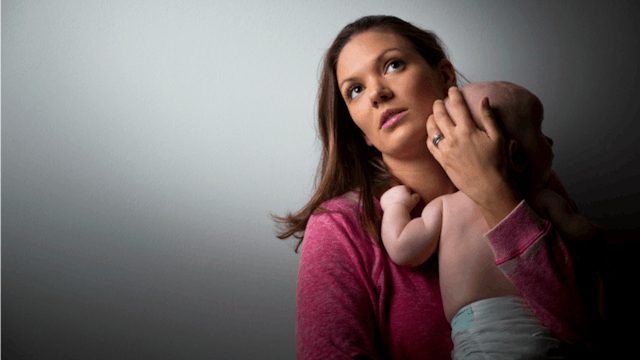It's Normal To Have Scary And Intrusive Thoughts After Having A Baby

It happened every time my newborn fell asleep. My thoughts would start racing, my heart beating out of my chest. What if he stops breathing? What if I go outside to take the trash out and get hit by a car? What if global warming fries the earth and my son doesn’t live past 20? What if he contracts some terrible disease? What if .. what if … what if …
The rest of the time, I was fine. But these thoughts would come to me then, when all the mommy-ing had slowed down and I was alone with myself. I had heard of the baby blues, and I’d had a good few days of crying early on. But this was different, and I seriously wondered if there was something wrong with me.
As time went on, these thoughts faded in intensity, and I mostly forgot about them. But I was reminded of this experience recently when I came across a post from blogger Constance Hall about the scary, intrusive thoughts she has each time she has a baby (Hall just had her fifth baby!).
“Something happens to me every single time I have a baby,” Hall writes, and then goes on to recount having visions of “horrible things” happening to her baby. She imagines her baby getting run over, falling off a balcony.
“It gets to the point where I can’t walk past a table without envisioning dropping the baby on the corner of the table and cracking its head open,” she writes.
Hall makes it clear that she has never been careless with her babies, or that she wishes harm on them in any way – only that she is always consumed with these terrifying thoughts postpartum.
The first time it happened, she spoke to her doctor and learned that these sorts of thoughts are actually very common. It’s just that no one talks about them. And after Hall posted this raw, honest account on Facebook and Instagram, she was flooded with comments from mothers who experienced the same thing.
For Hall, and many others, the thoughts are not incapacitating, but just kind of there, in the background of their lives.
“It’s isn’t debilitating at all, it doesn’t effect my parenting or my life,” says Hall.
Clearly, though, for some moms these sorts of thoughts really can become out of control, and turn into disorders like postpartum depression, anxiety, or OCD, all of which can be devastating for new moms.
So what’s normal, and what’s not? And how do you know if it’s time to get help?
To answer those questions, we touched base with Kelly Dardeen, Ph.D, a clinical psychologist from Indiana. Dardeen reiterated that these sort of intrusive thoughts are common postpartum. They aren’t necessarily a problem unless moms “aren’t able to redirect their thoughts, or they begin to develop compulsive behaviors that ‘relieve’ the thoughts,” Dardeen explains.
However, in some cases, these sort of thoughts can become “a precursor to postpartum OCD developing,” Dardeen says.
What would be a clue that you are actually dealing with postpartum anxiety or OCD?
“If they find themselves drawn into these thoughts so frequently that they aren’t able to participate in and complete their normal daily duties, then I would consider this a problem that may need additional intervention and/or a referral to a professions,” says Dardeen.
Of course, moms who are dealing with postpartum mood disorders sometimes have trouble recognizing themselves when things have spun out of control. That’s where a loving spouse or other support person comes in.
Here are some symptoms a spouse and/or support person might notice that would raise a red flag, according to Dardeen:
– A change in sleep patterns (beyond the normal sleep disruptions that a baby brings)
– Changes in eating patterns
– Consistent changes in mood
– Compulsive, repetitive behaviors not previously there, seeming to have no purpose
– Decrease in normal self care
If you or someone you love is experiencing any of these symptoms, bringing this up with a doctor and/or a therapist or counselor is vital. There is good, compassionate help out there, and each and every mom deserves it. Postpartum mood disorders are common; you are not broken for having one, and you will heal in time.
It goes without saying, too, that even if your symptoms are not this strong, if for any reason you feel “off,” you should speak to a doctor, trusted friend or a counselor, because all new moms need whatever TLC they can get – and having a safe place to honestly voice your feelings about new mommyhood is so, so important.
However, all that being said, it’s refreshing to know that something like having terrifying thoughts after you have a baby is fairly common, and there’s no reason to judge yourself about them.
Maybe it’s nature’s way of preparing you for the fact that once you’re a mom, worrying about your kids becomes your full-time job … forever and ever and ever.
Seriously, the worrying and fretting never really stops. But maybe that’s normal too. I’ll let you know in 20 years.
This article was originally published on